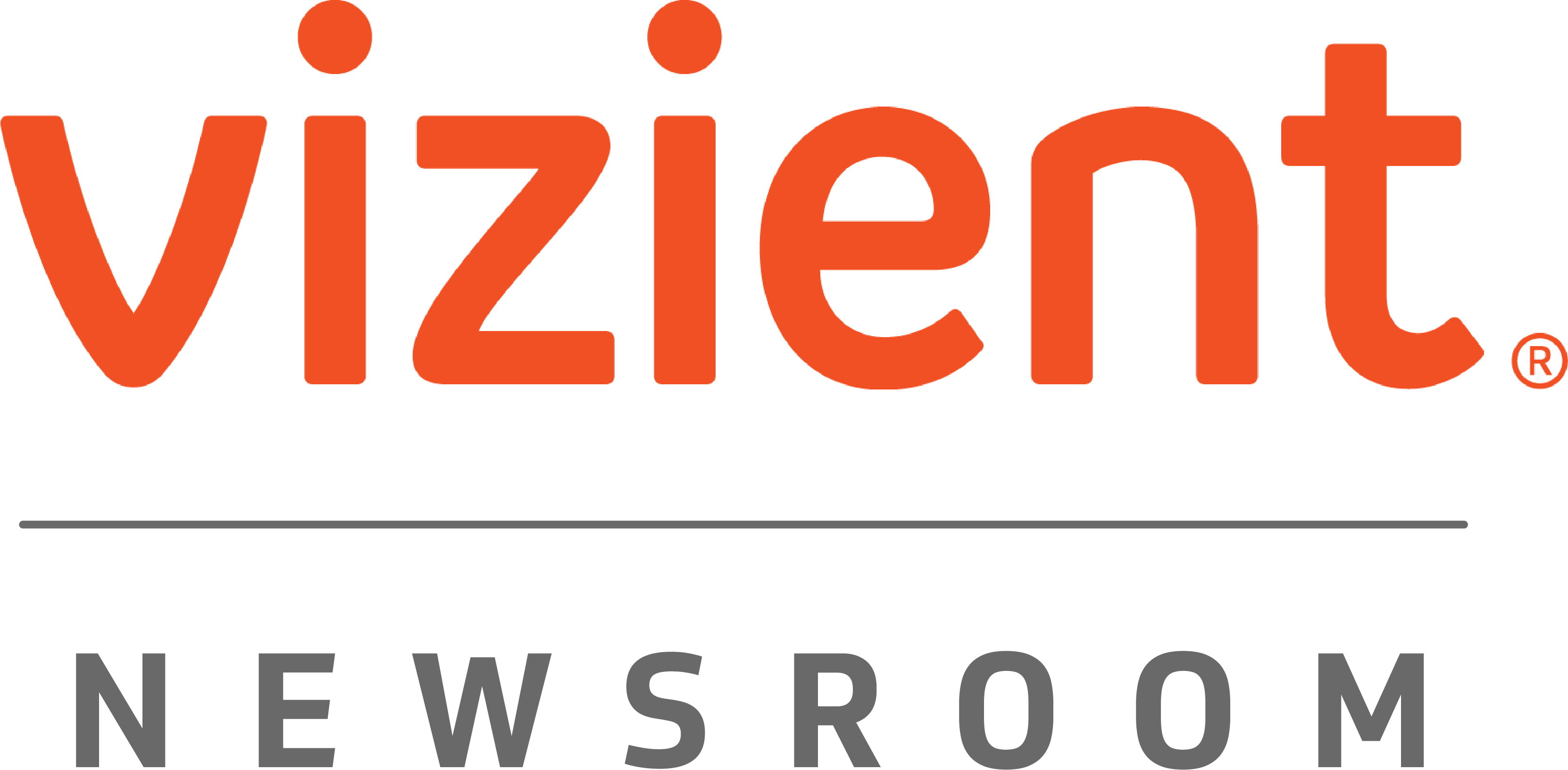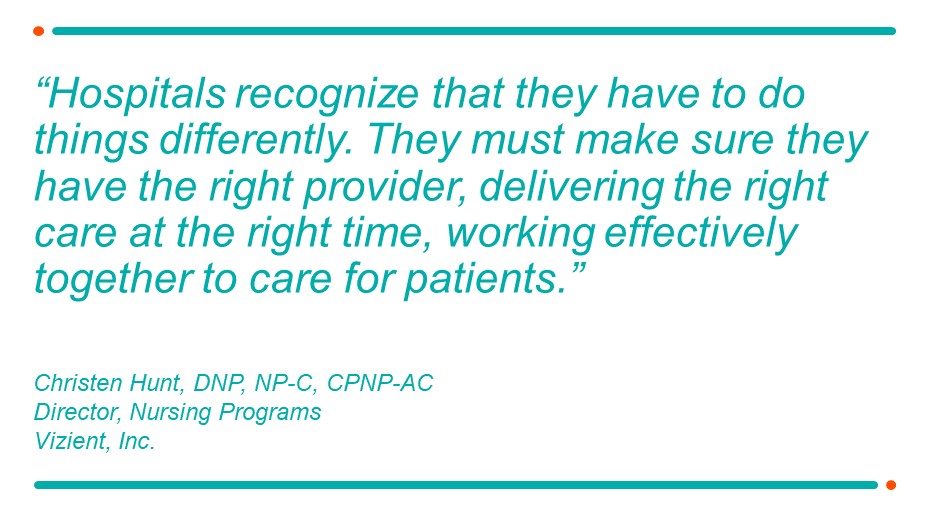In today’s increasingly complex health care environment, hospital leaders are challenged to improve patient outcomes, boost productivity, and increase provider and staff retention. Key to achieving these goals is having effective care teams that utilize each member to the fullest extent of their scope of practice and training.
High-performing hospitals and health systems recognize that each medical professional involved in patient care brings a unique blend of educational background, clinical experience and specific skill sets to the care process. To take full advantage of this cross-discipline expertise, organizations must ensure that physicians, APPs and other members of the care team are each practicing to the top of their license.
“Hospitals recognize that they have to do things differently. They must make sure they have the right provider, delivering the right care at the right time, working effectively together to care for patients,” says Christen Hunt, DNP, NP-C, CPNP-AC, director of nursing programs for Vizient. “This means creating an environment where clinicians are happy, engaged and fully utilizing their training and skills in their interactions with patients.”
This is easier said than done. For many organizations, breaking away from the traditional physician-led care model requires a fundamental culture change. Further, significant variation exists in how APPs are utilized, not only within states, but also within the same organization.
The Vizient Center for Advancing Provider Practices (CAP2) is a comprehensive web-based analytics solution for members to assess the culture, structure and processes that support care teams. The solution offers organizational workforce assessments, benchmarking reports, toolkits, educational webinars and networking opportunities that provide comprehensive insights into the efficiency of an organization’s care teams. The CAP2 program has recently expanded its focus beyond APPs to providing recommendations on how to optimize the entire care team.
The CAP2 scorecard
The Vizient CAP2 program helps hospitals and health systems understand where and how APPs are utilized as well as identifies practice variations that exist within their organization. “In many hospitals, integrating APPs successfully can be a challenge,” says Hunt. “For example, even though nurse practitioners and physician assistants can provide medical-level services, some organizations are underutilizing them by having them function as scribes. Other hospitals are missing billing opportunities when an APP is seeing a patient.”
To help identify these variations, the Vizient CAP2 program developed nine core characteristics essential for care team success. Participants receive an annual scorecard that assesses organizational structure and processes across these characteristics:
- Inclusive culture: Ensuring a flat governance structure where everyone has a voice and feels valued and respected.
- Leadership structure: Understanding the leadership structure and ensuring professional development opportunities exist for everyone.
- Orientation and onboarding: Evaluating how new providers are brought into the organization to ensure they have the tools to be successful and prevent turnover.
- Credentialing and privileging: Assessing how providers are credentialed and privileged to ensure a consistent process across both physicians and APPs.
- Competency assessment: Ensuring an organization follows best practices that enable safe, high-quality care and regulatory compliance.
- Compensation methodology: Examining full compensation and benefits methodology to ensure providers are incentivized to do their best work.
- Workforce optimization: Understanding who is doing what work and identifying opportunities for all providers to work to the top of their license.
- Productivity: Assessing the methodology used to measure productivity, e.g. work RVUs or team metrics.
- Billing practices: Evaluating inpatient and outpatient billing processes to identify missed opportunities, especially related to APP billing.
The annual scorecard provides organizations with a snapshot of their structure and processes that support the provider workforce. Through a guided analytic approach, this quickly identifies opportunities to maximize effectiveness of care teams, promote better clinical outcomes, reduce variation in practice and lower costs.
The assessment delivers deep insights into how an organization utilizes APPs and physicians, where they are practicing and what they are doing. “The workforce assessments are essentially a gap analysis allowing organizations to understand their current state, identify variations throughout their organization, and identify opportunities for change through comparative benchmarks,” adds Hunt.
Learning and improving
A faith-based, not-for-profit health system in the Midwest recently embarked on a number of initiatives to deliver highly coordinated primary care, including the Patient-Centered Medical Home model and Comprehensive Primary Care Plus. To improve access to care, the health system deployed a care team composed of a primary care physician, a triage nurse, two medical assistants and a care coordinator with a focus on team culture and avoiding staff burnout. After one year, the health system charted the following improvements:
- 98% increase in monthly average work RVUs
- 23% increase in average monthly ROI
- Increased satisfaction of care team members, physicians and support staff with their roles.
Lessons learned from this organization inspired the redesign of the Ambulatory Site/Clinic assessment. We identified the key metrics they needed to achieve these results and incorporated them into the new assessment. This will now allow our members to have a greater return on investment.
Vizient CAP2 members also find the program’s networking opportunities to be one of its most valuable aspects. Offerings include the AskCAP2 list server, member-driven workgroups and an annual conference.
“The workgroups are a great venue for sharing wins and struggles. If we hear that a lot of members are struggling with onboarding, we’ll put together a workgroup and bring people together on that issue,” says Hunt. “Everyone wants to help their fellow members succeed.”
For hospitals to excel in the new health care climate, care models must evolve. Read more about how the Vizient CAP2 program can position your care teams for success or contact us today.

